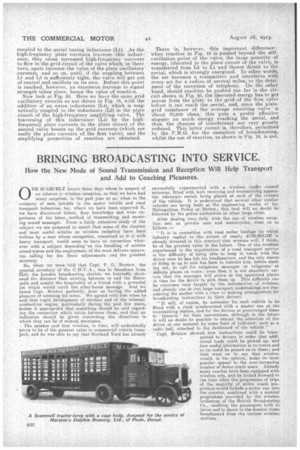BRINGING BROADCASTING INTO SERVICE.
Page 14

If you've noticed an error in this article please click here to report it so we can fix it.
How the New Mode of Sound Transmission and Reception Will Help Transport and Add to Coaching Pleasures.
ONE SCARCELY knows these days whom to suspect of an interest in wireless reception, so that we have had many surprises, in the past Year or so, when in the company of men notable in the motor vehicle and road transport industries, for, where we have least expected it, we have discovered talent, deep knowledge and wide experience of the latest, method of transmitting and receiving sound messages. From a fairly extensive study of the subject we are prepared to assert that some of the clearest and most useful articles on wireless reCeption have been written by a man whose occupation, concerned as it is with heavy transport, would seem to have no connection whatever with a subject denending•on the handling of minute sound-waves and the employment of the most delicate apparatus calling for the finest adjustments and the greatest accuracy.
So, when we were told that Capt. F. G. Bristow, the general. secretary of the C.M.U.A., was to broadcast from 2L0, the London broadcasting station, we hurriedly shortened the distance then existing between us and the Metropolis and sought the hospitality of a friend with a powerful sot which would catch the ether-borne message. And we heard Capt. Bristow perfectly, later on having the added pleasure of scanning his notes. We agreed with him when he said thatrapid development of wireless and of the internalcombustion engine, particularly during the past few years, makes it appropriate that something should be said regarding the connection which exists between them, and that an indication should be given concerning the directions in which they can be of mutual assistance.
The speaker said that. wireless, in time, will undoubtedly -prove to be of the greatestvalue' to commercial vehicle transport, and he was able to say that. Scotland Yard has already successfully experimented with a wireless traffic control motorcar, fitted with both receiving and transmitting apparatus, telescopic aerials being placed at each of the corners of the vehicle. It is understood that Several other similar Vehicles are being built at the engineering works of the Metropolitan Police at Barnes; this lead will no doubt be followed by the police authorities in other large cities. • After dealing very fully with the use. of wireless. reception sets on private cars and motorcycles, went on as follows :— "It is in connection with road motor haulage (in which industry capital . to the extent of neatly 2150,000,0010 is already invested in this country) that wireless will, I think, be of the greatest value in the future.. One of the troubles experienced in the organization of a road transport service is the difficulty Ori being able to keep in touch with the driver once he has left his headquarters, and the only means of doing 50 up to now has been to instruct him, before starting out, to call for telephone messages or telegrams at definite places en route; even then it is not absolutely certain that the messages will arrive at the appointed places in time for the driver to pick them up. This difficulty can be overcome very largely by 'the introduction of wireless, and already one or two large transport undertakings are considering the matter with a view to malting arrangements for broadcasting 'instructions to their drivers.
"It will, of course, be necessary 'for each vehicle to be fitted with a. clock synchronized with a master one at the transmitting station, and for the drivers at prearranged times to listen-in ' for their instructions, although in the future it will no doubt be possible to attract the attention Of the driver at any moment by some form of 'indicator, such as a radio bell, attached to the dashboard of the vehicle."
Capt. Bristow showed how instructions could . be trans . mitted to drivers in order that, addi tional loads could be picked up, and how useful information as to routes and so on could be passed on to them; and then went on to say that wireless would, in his opinion, make its most popular appeal to the ever-increasing number of motor coach users. Already .rnany coaches have been equipped with wireless sets, and he looked forward to the time when the programme of trips of the majority of motor coach proprietors would include a motor run into the country, combined with a musical programme provided by the wireless orchestras of the British Broadcasting Co., enabling the passengers both to listen and to dance to the musical items broadcasted from the various wireless stations.




























